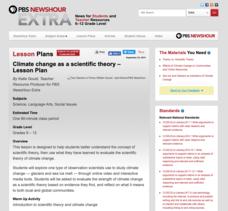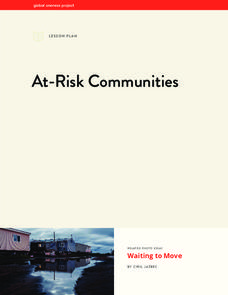PBS
Climate Change as a Scientific Theory
Get your class thinking about climate change as a scientific theory. Guided by a handout, emerging earth scientists read articles and take notes about glaciers and sea ice. To conclude, they write an evaluation of the evidence for...
Curated OER
Observing Reactions
Young scholars use the scientific method to complete to experiments that have visible reactions. In this visible reaction lesson, students participate in an experiment with melting ice and one with inflating a balloon. Young scholars...
K5 Learning
Changes
You can't unring a bell, but can you unmelt an ice cube? Readers consider reversible and irreversible changes with a short informational reading passage and accompanying comprehension questions.
Curated OER
Why Do Ice Cubes Melt?
First graders investigate water properties by participating in a hands on experiment. In this ice formation lesson plan, 1st graders examine real ice cubes in a bowl and identify the reasons why certain cubes melt faster than others....
Curated OER
Environment: Clouds of Changing Times
Here is a wonderful lesson plan which has youngsters interview family and local elders about the seasonal history of their local area. They focus on climate change by asking questions about rainfall, temperatures, length of the seasons,...
Curated OER
Water and Ice
Students examine water. In this chemistry lesson, student examine the physical properties of water and how it changes from a liquid to a solid or a gas. This lesson contains links to a second and third complimentary lesson on...
Curated OER
Slippery, Slippery Ice
Young scholars investigate how salt affects ice by experimenting in class. In this water properties lesson, students utilize a penny, salt and pans of ice to examine the sliding ability of a penny across a layer of ice. Young...
Curated OER
Snowman
Learners read books, learn about the letter s, and eat snow all to learn about snowmen. In this snowman lesson plan, students also view ice melting and sing songs.
Curated OER
Rain Formation
First graders investigate the different water formations by conducting an experiment. In this water properties lesson, 1st graders examine jars filled with ice, rain water, air and snow in their class. Students predict what...
Curated OER
Creative Expressions: Phase Changes
Students place themselves in the position of a water molecule, ice molecule, or steam molecule and then describe the process of changing phase.
Curated OER
Elements In Chemistry: Solids, Liquids and Gases
Students investigate the kinetic-molecular theory. In this state of matter instructional activity, students consider the differences of melting glaciers, melting icebergs and investigate on what happens when submerged water melts.
Curated OER
Reaction Rates-Catalysis, Concentration, Surface Area, and Temperature
Students determine the meanings of concentration, surface area, and catalysis through an experiment. In this lesson about chemical reactions, students participate in an experiment. Students complete three different parts of the...
Global Oneness Project
At-Risk Communities
"Waiting to Move," a photo essay by Ciril Jazbec, brings into sharp focus the threats posed by climate change. Class members examine images of Shishmaref Island and the Native Alaskan Inupiate coastal villages that are impacted by rising...
Curated OER
Chilling Predictions
Students research and prepare an almanac on the Arctic. They examine the laws that attempt to provide jurisdiction over this area and consider how these laws be affected if geography of the Arctic continues to change due to global warming.













